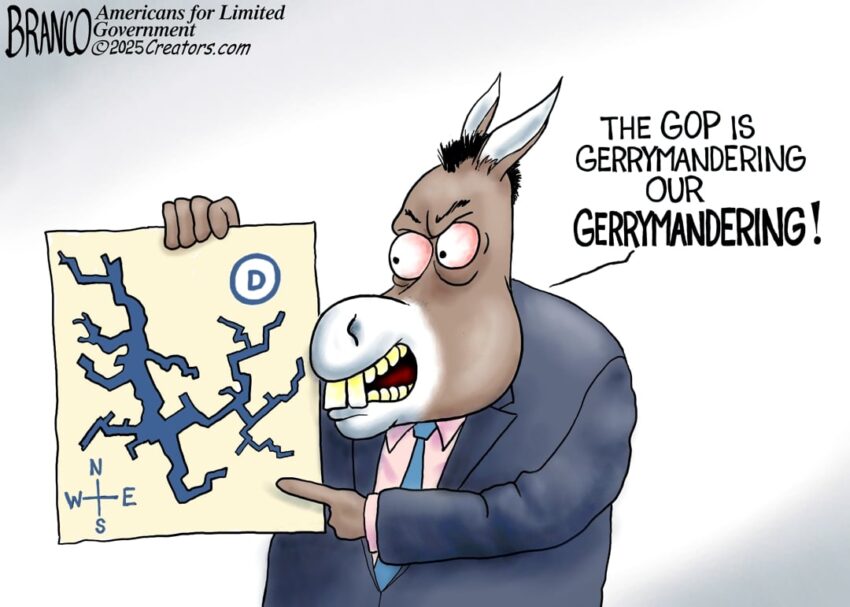The constitutionally dubious practice of states using race as a variable to redraw congressional districts, which largely shifts power to Democrats in the House of Representatives, is being called into question before the Supreme Court in a Louisiana case that could set a strong precedent for the rest of the country.
After hearing 80 minutes of arguments in March, the Supreme Court is scheduled to hear additional arguments Oct. 15 to arrive at a decision in Callais v. Louisiana and determine whether a state using race as a variable in redistricting violates the 14th and 15th amendments to the Constitution. The ruling will set a precedent on the controversial practice of race-based redistricting and have a significant impact on the rest of the country’s redistricting process ahead of the battle for control of the House of Representatives next year.
While the Supreme Court will hear arguments in Callais v. Louisiana in less than two months, Americans have already weighed in and a strong majority — including a majority of Black and Hispanic voters — do not believe race should be used when creating new congressional districts.
Cygnal, a polling firm that challenges prevailing media narratives with hard data, beat the headlines and asked voters to weigh in on race-based redistricting earlier this month, and found the dubious practice is extremely unpopular.
The survey of 1,500 voters conducted August 7-9 found that voters say by a resounding 47 points — 69 percent to 22 percent — that the government should not consider race when redistricting or creating new congressional maps.
Even among Black and Hispanic voters — who could arguably benefit from a race-based redistricting process — voters reject the practice of using race to create new districts. Whites oppose race-based redistricting by 56 points, 74 percent to 18 percent, but Hispanics and Blacks also oppose the practice. Hispanics oppose race-based redistricting by 20 points, 55 percent to 35 percent, and Blacks oppose it by eight points, 49 percent to 41 percent. Independents oppose race-based redistricting by 53 points, 73 percent to 20 percent, and moderates oppose it by 45 points, 67 percent to 22 percent.
At the core of the court’s decision in the Louisiana case is whether the “intentional creation of a second majority-minority congressional district violates the Fourteenth or Fifteenth Amendments to the U.S. Constitution”, according to an August 1st order from the court.
In a larger sense, the Supreme Court appears to be tackling whether the Voting Rights Act, a piece of civil rights legislation that encourages states to draw “minority-majority” districts in certain cases, is in violation of the Constitution. The 14th Amendment to the Constitution promises equal protection under the law for citizens, and the 15th Amendment prohibits government from denying a citizen the right to vote based on race. The 14th and 15th Amendments together appear to legally take care of the issue of unequal treatment under the law and race-based discrimination around voting, and strictly prohibit it.
What the Court is considering is the following: if race should not be used to deny minorities representation by drawing congressional districts that intentionally deny them representation, wouldn’t it make sense that race should also not be used to deny other groups representation? Is the intentional creation of districts based on race, that favor one race over others, unlawful? This appears to be the core of what the Court will address, and the results will have legal ramifications not only for other states attempting to use race-based redistricting, but cultural implications around legislation that undermines the Constitution.
Manzanita Miller is the senior political analyst at Americans for Limited Government Foundation.
The post Supreme Court To Rule On Race-Based Redistricting And Voters Weigh In Opposing The Questionable Practice appeared first on Daily Torch.
Click this link for the original source of this article.
Author: Daily Torch
This content is courtesy of, and owned and copyrighted by, https://dailytorch.com and its author. This content is made available by use of the public RSS feed offered by the host site and is used for educational purposes only. If you are the author or represent the host site and would like this content removed now and in the future, please contact USSANews.com using the email address in the Contact page found in the website menu.








